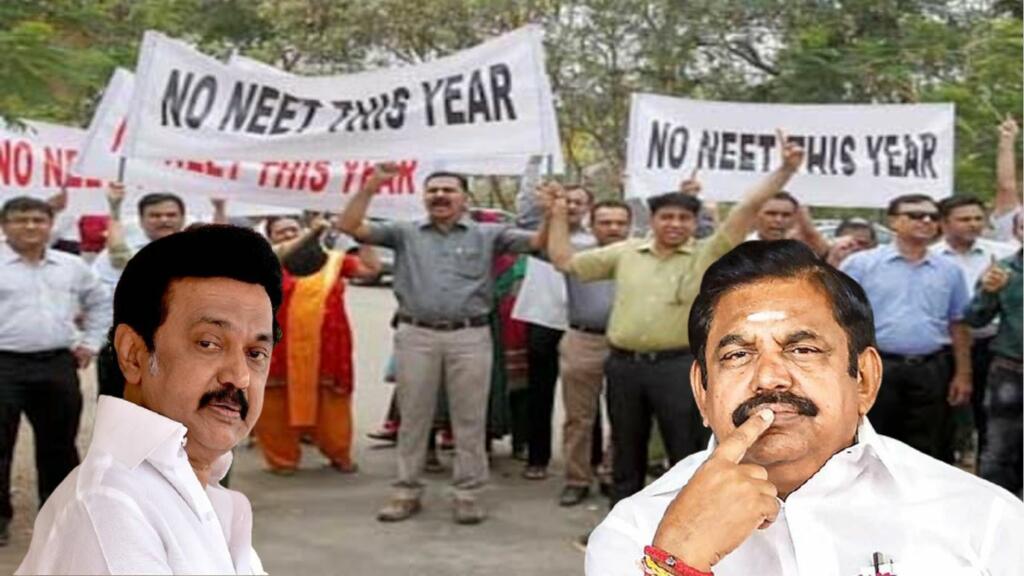In Tamil Nadu, protests against the National Eligibility cum Entrance Test (NEET) are not a new phenomenon. It is one of the very few issues which brings about a sense of camaraderie and bipartisanship among various parties and political leaders of the state. The DMK, AIADMK, Congress and others are all hand-in-glove with demands for exempting Tamil Nadu from the purview of NEET. Recently, the DMK-led government of Tamil Nadu even passed a bill in the state assembly making NEET ‘optional’ for medical aspirants in the state, with scant regard for the consequences that such a step might have.
The bill seeks to provide for admission to undergraduate courses in medicine, dentistry, Indian medicine, and homeopathy based on marks obtained in Class 12 exams. It says that an exam like NEET has “shattered the hopes and dreams of Tamil Nadu students” aspiring for a medical or dental seat.
What about NEET is so Troubling for Tamil Politicians?
It is not a mere coincidence that all politicians in Tamil Nadu agree so unanimously on this issue. The consideration is simply financial in nature. Tamil Nadu has the highest number of medical colleges in India, and many of them are owned by politicians of the state. These individuals have either held public offices in the past or currently do. It was in 2017 that NEET was made mandatory for medical admission in Tamil Nadu. An attempt by the then AIADMK government to exempt the state’s students from the entrance test was overturned by the Supreme Court.
What the AIADMK did back then through an ordinance has been done now too, by MK Stalin’s DMK. However, the bill is still not expected to get the President’s nod, which would mean that NEET would continue to be mandatory in Tamil Nadu.
Read More: Dear people of Tamil Nadu, No Indian PM has treated your state with such respect in the past
In response to a query under the Right to Information Act, the MGR Medical University revealed that government school students could secure only 213 of 29,925 medical seats between 2006 and 2016 (0.7 percent). The introduction of NEET irked Tamil politicians big time. NEET has acted as a boon for government school students. The real effect, however, came in the form of commercial medical colleges suddenly finding themselves incurring losses. Most of these institutions are under the patronage of political leaders in Tamil Nadu if they are not already owned by them directly.
NEET Hurts Fortunes of Cash-Hungry Politicians
Entrance tests like NEET establish a level-playing field and give everyone an equal opportunity to prove their mettle and get seats at medical and engineering colleges based on their merit alone. There is no scope of incurring favours, nepotism, corruption, and the kind. Those who perform well will get seats in government colleges. So, those who would otherwise have to pursue their medical dreams by filling the coffers of private colleges and universities prior to NEET being mandatory in Tamil Nadu now become doctors at affordable costs.
Also, political parties, with NEET becoming the deciding factor in medical college admission, can no longer play caste politics and grant admission to only their voters at government institutes. Those who deserve admissions will get them, and there is little to nothing which the likes of DMK can do to prevent such social justice.
In Tamil Nadu, at least 75 per cent of the private higher education institutes are dominated by former and current politicians. Dr MGR University, for instance, is owned by New Justice Party President A C Shanmugam. AIADMK MP Thambidurai runs St Peter’s University. A C Shanmugam and S. Jagatrakshagan also own Balaji medical/dental college, Bharat university and ACS Medical college. Meanwhile, MK Leader E V Velu owns colleges in his home city, Thiruvannamalai. DMK leader Duriamurugan’s son owns Kingston Engineering College in Vellore.
Prior to NEET becoming mandatory in Tamil Nadu, medical seats were sold at over Rs 1 crore, and we are not even talking about private institutions here. This was the case for admission into government medical colleges!
Flimsy Excuses
To masquerade their hurt, Tamil politicians are using the premise of “social justice”. They claim that NEET does not ensure social justice, and it gives an advantage to the already ‘privileged’. Why only 0.7 per cent of government school students could secure medical seats between 2006 and 2016 is something which they, naturally, ignore conveniently. The fact is that NEET has ensured a level-playing field to a large extent for medical admissions. No system is perfect, but a NEET regime is far better for Tamil Nadu than the non-existence of a system altogether prior to 2017.
Political parties of Tamil Nadu also claim that there is a large disparity between the NEET syllabus, and the one taught to class 11 and 12 students of Tamil Nadu. This is a stone-cold lie. In 2018, Tamil Nadu updated the state syllabus textbooks. An analysis of the NEET question paper showed that 97 percent of the questions in NEET-2020 were covered in the updated TN textbooks.
The state government said that the suicide by students – more than 10 NEET aspirants’ suicide in the last few years – is due to the ‘imposition’ of NEET. However, the real problem lies with high coaching fees, digital divide, lack of JNV like schools, and adoption of a nationally standardized syllabus, which the government is not willing to address.
The reality is that NEET is dismantling the higher education empire of Tamil politicians, which is why they are desperately trying to get rid of the entrance test. Their efforts, however, are bound to fail.
